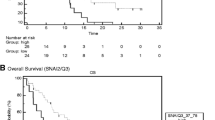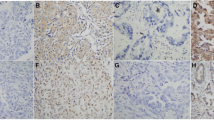Abstract
Objective
Midkine (MK), a new member of the heparin-binding growth factor family, was found recently to have a high expression level in many carcinoma specimens, including those of the esophagus, gall bladder, pancreas, colorectum, breast and lung. Estrogen receptor beta (ER-β), a recently cloned estrogen receptor subtype, was also found to be highly expressed in lung tumor tissue, in contrast to a lower level of expression in normal lung tissue. However, few relevant studies on these proteins have been published. The aims of our study were to investigate the expression of midkine and ER-β proteins in non-small cell lung cancer (NSCLC) and to examine the relationship between their expression and the clinicopathologic data as well as to analyse the correlation of their expression in NSCLC.
Methods
By immunohistochemistry, MK and ER-β were examined in 24 surgically resected cases of NSCLC with their corresponding paraneoplastic and normal lung tissues.
Results
MK and ER-β were overexpressed in NSCLC. The levels of MK and ER-β expression in NSCLC were found to be significantly negatively correlated with the pathological classification (P = 0.042 and 0.021, respectively), and their expression decreased with a raise in the classification. Spearman’s correlation analysis showed that the correlation of their expression in NSCLC was strong (correlation coefficient [r s ] = 0.535, P = 0.007 < 0.01).
Conclusion
The expression levels of MK and ER-β to some extent reflect the malignant degree of NSCLC, and their combined detection may be of great value in early diagnosis, treatments of patients with NSCLC and can predict the prognoses.
Similar content being viewed by others
References
Mollerup S, Jørgensen K, Berge G, et al. Expression of estrogen receptors alpha and beta in human lung tissue and cell lines. Lung Cancer 2002; 37: 153–159.
Kadomatsu K, Tomomura M, Muramatsu T. cDNA cloning and sequencing of a new gene intensely expressed in early differentiation stages of embryonal carcinoma cells and mid-gestation period of mouse embryogenesis. Biochem Biophys Res Commun 1988; 151: 1312–1318.
Michikawa M, Kikuchi S, Muramatsu H, et al. Retinoic acid responsive gene product, midkine, has neurotrophic functions for mouse spinal cord and dorsal root ganglion neurons in culture. J Neurosci Res 1993; 35: 530–539.
Kadomatsu K, Muramatsu T. Midkine and pleiotrophin in neural development and cancer. Cancer Lett 2004; 204: 127–143.
Krzystek-Korpacka M, Matusiewicz M, Banaś T. Structure and function of midkine, a novel heparin-binding growth factor. Postepy Hig Med Dosw (Online) 2006; 60: 591–601.
Yaling Hung, Guochun Cao, Hui Wang, et al. The expression and location of midkine in gastric carcinomas of Chinese Patients. Cell & Molecular Immunology 2007; 4: 135–140.
Garver RI Jr, Chan CS, Milner PG, et al. Reciprocal expression of pleiotrophin and midkine in normal versus malignant lung tissues. Am J Respir Cell Mol Biol 1993; 9: 463–466.
Li HW, Ping JL, Dai LC, et al. Expression of midkine protein in non-small cell lung cancer and its clinical significance. China Oncology 2005; 15: 331–334 (Chinese).
Xu JH, Yang YH, Dong DQ, et al. Expression and significance of midkine protein in non-small cell lung cancer. J of Clinical Medicine 2007; 24: 130–132 (Chinese).
Murphy LC, Watson PH. Is oestrogen receptor-beta a predictor of endocrine therapy responsiveness in human breast cancer? Endocr Relat Cancer 2006; 13: 327–334.
Hershberger PA, Vasquez AC, Kanterewicz B, et al. Regulation of endogenous gene expression in human non-small cell lung cancer cells by estrogen receptor ligands. Cancer Res 2005; 65: 1598–1605.
Colditz GA, Hankinson SE, Hunter DJ, et al. The use of estrogens and progestins and the risk of breast cancer in postmenopausal women. N Engl J Med 1995; 332: 1589–1593.
Enmark E, Pelto-Huikko M, Grandien K, et al. Human estrogen receptor beta-gene structure, chromosomal localization, and expression pattern. J Clin Endocrinol Metab 1997; 82: 4258–4265.
Márquez-Garbán DC, Chen HW, Fishbein MC, et al. Estrogen receptor signaling pathways in human nonsmall cell lung cancer. Steroids 2007; 72: 135–143.
Li GF, Wang K, Zhang CZ. Expression of estrogen receptors in non-small lung cancer and present situation and progress on tamoxifen treatment. Chin J Lung Cancer 2005; 8: 160–162 (Chinese).
Omoto Y, Kobayashi Y, Nishida K, et al. Expression, function, and clinical implications of the estrogen receptor beta in human lung cancers. Biochem Biophys Res Commun 2001; 285: 340–347.
Schwartz AG, Prysak GM, Murphy V, et al. Nuclear estrogen receptor beta in lung cancer: expression and survival differences by sex. Clin Cancer Res 2005; 11: 7280–7287.
Wu CT, Chang YL, Shih JY, et al. The significance of estrogen receptor beta in 301 surgically treated non-small cell lung cancers. J Thorac Cardiovasc Surg 2005; 130: 979–986.
Yamashita S, Okada Y. Application of heat-induced antigen retrieval to aldehyde-fixed fresh frozen sections. J Histochem Cytochem 2005; 53: 1421–1432.
Skov BG, Fischer BM, Pappot H. Oestrogen receptor beta over expression in males with non-small cell lung cancer is associated with better survival. Lung Cancer 2008; 59(1):88–94
Huang YL, Hou YY. Research progress of the relationship between MK and tumor. Cancer Research on Prevention and Treatment 2007; 34: 161–163 (Chinese).
Taylor AH, Al-Azzawi F. Immunolocalisation of oestrogen receptor beta in human tissues. J Mol Endocrinol 2000; 24: 145–155.
Kato M, Shinozawa T, Kato S, et al. Increased midkine expression in hepatocellular carcinoma. Arch Pathol Lab Med 2000; 124: 848–852.
Peng AM, Cang LQ, Liu RF, et al. Expression of ER/PR in lung cancer tissue and tamoxifen treatment. Journal of Shanghai Tiedao University (Medical Edition) 2000; 21: 59–62 (Chinese).
Kawai H, Ishii A, Washiya K, et al. Estrogen receptor alpha and beta are prognostic factors in non-small cell lung cancer. Clin Cancer Res 2005; 11: 5084–5089.
Wang Q, Huang Y, Ni Y, et al. siRNA targeting midkine inhibits gastric cancer cells growth and induces apoptosis involved caspase-3,8,9 activation and mitochondrial depolarization. J Biomed Sci 2007; 14: 783–795.
Author information
Authors and Affiliations
Corresponding author
Additional information
This work was supported by a grant from General Program of Jiangsu Province Hygiene Department (No.K200601).
About this article
Cite this article
Zhang, S., Zhao, G., Wang, Q. et al. Correlation and significance of midkine and estrogen receptor beta protein expression in non-small cell lung cancer. Chin. J. Clin. Oncol. 5, 418–423 (2008). https://doi.org/10.1007/s11805-008-0418-3
Received:
Accepted:
Published:
Issue Date:
DOI: https://doi.org/10.1007/s11805-008-0418-3




